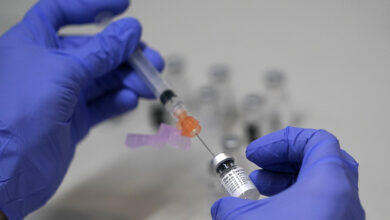Kids’ weight gain tied to idle virtual learning, disrupted sleep, pediatricians warn

[ad_1]
Pediatricians are noting an uptick in children’s weight due to pandemic-related difficulties, namely disrupted sleep cycles and too much time spent sitting idly during virtual learning.
Dr. Roy Kim, head of pediatric endocrinology at Cleveland Clinic Children’s, told Fox News that many children are “not moving their bodies much at all” as they spend more time in front of devices, while sleep disturbances take a toll on energy and emotional coping skills.
“For some this leads to eating more,” Kim explained, noting anecdotal evidence of kids often gaining an additional 10 to 20 pounds or more within three to six months, beyond usual weight gain associated with growth. These issues, coupled with a “very low level of physical fitness” compound risk factors and makes otherwise enjoyable physical activities less fun, he said.
Dr. Tammy Brady, associate professor of pediatrics and medical director of the pediatric hypertension program at the Johns Hopkins University School of Medicine also noted issues like altered sleep cycles and less activity tied to virtual learning, specifically among kids battling obesity and high blood pressure. Both experts suggested that less supervision gives way to more snacking and grazing on unhealthy foods.
NEW US DIETARY GUIDELINES: NO CANDY, CAKE FOR KIDS UNDER 2
“Many of these issues will be hard to address until we beat the virus through masking, vaccinations and increased immunity in our community,” Kim wrote in an email. “However we can take measures to improve things until that day.”
The pediatricians recommended ensuring a full night’s sleep, or at least eight hours, and brief bouts of exercise throughout the day. Try a 10-minute break each hour to walk, stand or do something active, Brady recommends. Also set aside time for a longer exercise session or fun physical activity.
Sharing meals together at the family dinner table during scheduled times can also help cut down on snacking.
CORONAVIRUS IN THE US: STATE-BY-STATE BREAKDOWN
Obesity affects nearly one-fifth of children ages 2-19 years in the U.S., with the highest obesity rate among ages 12-19 years (21.2%) followed by ages 6-11 at 20.3% and 13.4% in kids ages 2-5, per most recent data available from December, according to Dr. Marisa Censani, director of the pediatric obesity program at Weill Cornell Medicine and NewYork-Presbyterian.
For healthy eating, Censani advised whole grains and fresh foods with fiber, and limiting high calorie sugary drinks and processed foods. Healthy foods like nuts, beans, high fiber fruits such as pears, berries, and apples, and whole grain breads encourage stable blood sugar levels, she said.
“Children with obesity are more likely to become adults with obesity, with development of associated health problems including type 2 diabetes, stroke, and ischemic heart disease later in life,” Censani wrote in an emailed statement.
The American Academy of Pediatrics previously encouraged pediatricians to screen kids for “obesity onset or worsening,” when also evaluating access to nutrition and exercise amid the pandemic. AAP released guidance in December to help doctors counsel families on healthy lifestyle practices during the challenging pandemic.
Fox News has requested comment from AAP on pediatric weight gain during the pandemic.
“Not all children can maintain healthy nutrition and physical activity during the pandemic,” Dr. Sandra Hassink, medical director for the Institute of Healthy Childhood Weight, previously said in a news release. “Pediatricians need to assess for food insecurity, access to healthy foods, opportunities for safe physical activity and are encouraged to connect families with community resources to help with financial, housing or food needs and plan together to reduce family stress and find ways to improve children’s health.”
[ad_2]
Source link





